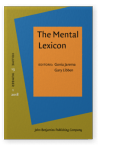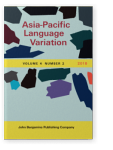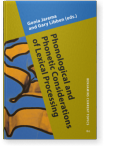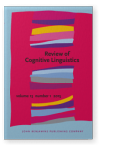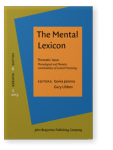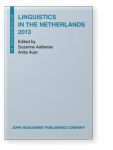Marjoleine Sloos
List of John Benjamins publications for which Marjoleine Sloos plays a role.
2022 The role of word frequency in the L2 acquisition of variable patterns: A case study of the pronunciation of English words with –man by Chinese learners Linguistics in the Netherlands 2022, Vogels, Jorrig and Sterre Leufkens (eds.), pp. 279–294 | Article
Second language acquisition often involves the acquisition of stable patterns in a target language. Here we investigate how the acquisition of a variable pronunciation pattern, viz. the pronunciation of the semisuffix -man in professional names in English (e.g. policeman, businessman) is related… read more
2018 Calculating a pattern’s competitive strength: Competition between /æ/ and /ʌ/ in irregular simple pasts and past participles in English The Mental Lexicon 13:1, pp. 143–157 | Article
This article proposes a measure of the competitive strength of two rival patterns in the domain of a subgroup of irregular verbs in English. There is competition between simple pasts built on the vowels /æ/ and /ʌ/, and the same competition is found in the domain of past participles. As a result… read more
2018 Same stimuli, same subjects, different perception: Believed dialect bias in the perception of Chinese plosives Asia-Pacific Language Variation 4:2, pp. 231–252 | Article
Believed dialect influences speech perception by linguistically naïve speakers. How much accent-induced bias affects perception of linguistically trained speakers is still unclear. This study experimentally investigates the influence of believed dialect on plosive perception by subjects who were… read more
2015 The reversal of the BÄREN-BEEREN merger in Austrian Standard German Phonological and Phonetic Considerations of Lexical Processing, Jarema, Gonia and Gary Libben (eds.), pp. 101–118 | Article
In language change, a reversal of a merger is generally considered to be impossible, since after two sounds have become fully merged, they are no longer distinct, so no phonetic or phonological cues exist that could reverse this process. This article investigates such an ‘impossible’ merger… read more
2015 Accent-induced coder bias Review of Cognitive Linguistics 13:1, pp. 59–80 | Article
Recent research has shown that speech perception can easily be influenced by the overall accent of the speaker. This paper investigates whether such accentinduced bias also occurs in speech transcription by professional and linguistically trained coders and to what extent such a bias may affect… read more
2014 The four tones of Mandarin Chinese: Representation and acquisition Linguistics in the Netherlands 2014, Auer, Anita and Björn Köhnlein (eds.), pp. 180–191 | Article
In this paper we discuss the four tones of Standard (Beijing) Mandarin Chinese. First, we will suggest a proposal for their phonological representation. Then, we discuss the order in which they are acquired in first language acquisition, relating this both to the representations we propose and to… read more
2013 The reversal of the BÄREN-BEEREN merger in Austrian Standard German Phonological and Phonetic considerations of Lexical Processing, pp. 353–371 | Article
In language change, a reversal of a merger is generally considered to be impossible, since after two sounds have become fully merged, they are no longer distinct, so no phonetic or phonological cues exist that could reverse this process. This article investigates such an ‘impossible’ merger… read more
2013 Acquiring markedness constraints: The case of French Linguistics in the Netherlands 2013, Aalberse, Suzanne and Anita Auer (eds.), pp. 188–200 | Article
This paper questions the assumption made in classic Optimality Theory (Prince & Smolensky 1993 [2004]) that markedness constraints are an innate part of Universal Grammar. Instead, we argue that constraints are acquired on the basis of the language data to which L1 learning children are exposed.… read more
2011 Input-Reduplicant correspondence in Leti Linguistics in the Netherlands 2011, Nouwen, Rick and Marion Elenbaas (eds.), pp. 112–124 | Article

